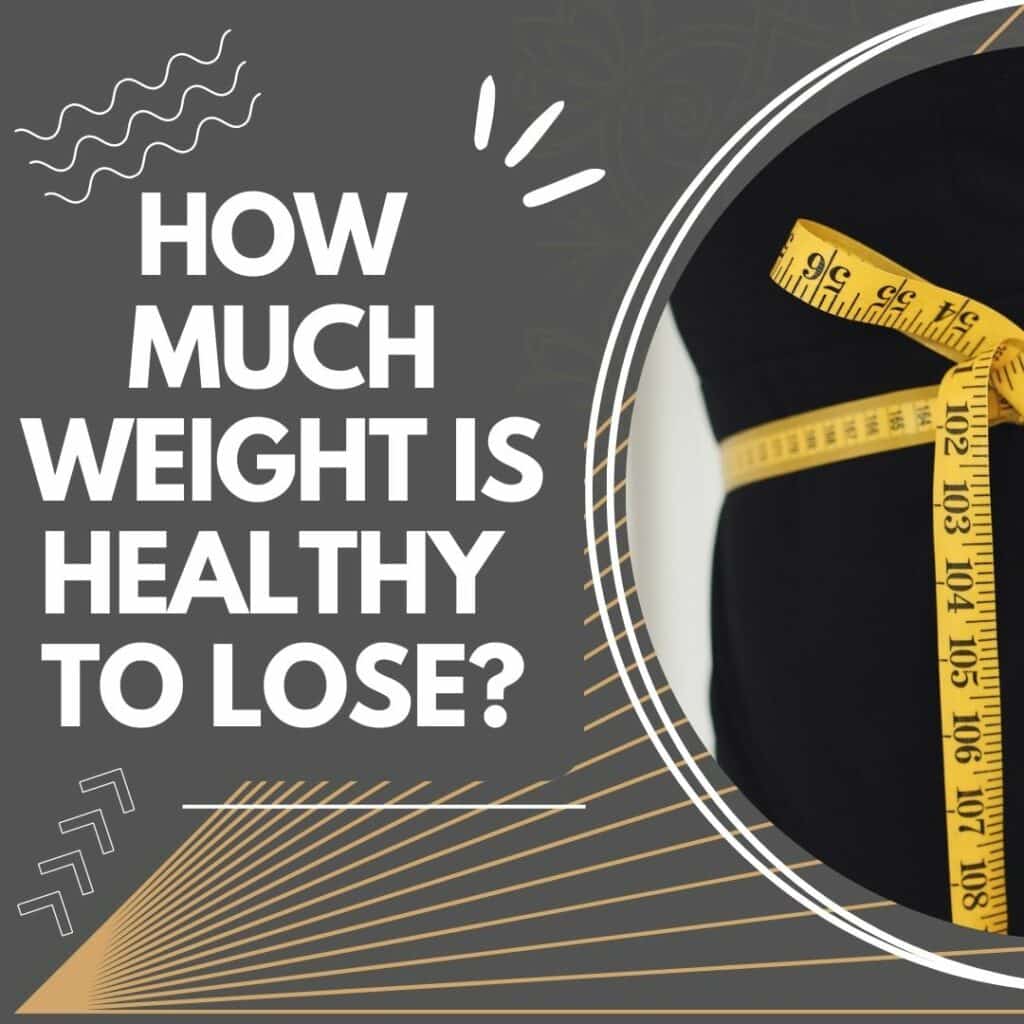How Much Weight is Healthy to Lose?

Disclosure: You should be aware that some of the links in this article may be affiliate links, which means that if you decide to buy something through one of these links, I may receive a commission, which does not increase the cost to you. This site does not provide financial or medical advice and is just for entertainment purposes. In our privacy policy, you may see our affiliate disclosure.
What is a healthy amount of weight to lose? Because the answer to this question is dependent on several individual factors, such as height, age, gender, body composition, and exercise level, there is no one right way to respond to this topic.
On the other hand, the majority of weight loss professionals think that a healthy rate of weight loss is between one and two pounds per week. This indicates that if you want to drop twenty pounds, it will take you somewhere between ten and twenty weeks to attain your objective weight.
Why do people want to lose weight?
Many reasons affect a person’s motivation to lose body fat. Some individuals have the goal of improving their health, while others have the goal of improving their appearance. Still, others are interested in doing so for reasons related to physical activity.
The majority of people who are overweight believe that if they lose some weight, they will experience an improvement in their general well-being. They anticipate having more energy and being able to take part in activities that they take pleasure in as a result of this change. In addition to this, they believe that if they reduce their body weight, they will be healthier in general.
People who struggle with their weight and their appearance frequently have low self-esteem. They could have the misconception that they are not appealing to others or do not measure up to certain standards of excellence. These individuals may find that losing weight helps them feel better about themselves, which in turn boosts their confidence.
What is a healthy rate of weight loss?
People who lose weight slowly and steadily (between one and two pounds per week) have a better chance of successfully maintaining their weight loss. To lose weight in a healthy way, you need more than simply a “diet” or “program.” It’s about adopting a way of life that includes adopting healthy eating choices and becoming physically active regularly.
Losing weight can be a difficult and frustrating process. Many people want to lose weight for health and well-being reasons, but don’t know how to lose weight in a healthy way. There are a few things you should keep in mind when trying to lose weight.
First, you should set a realistic goal. If you’re looking to lose a significant amount of weight, it’s important to set an achievable goal. Losing 1-2 pounds per week is considered a healthy rate of weight loss.
Second, you need to create a plan. This plan should include healthy eating and exercise habits that you can stick to long-term. Creating healthy habits is key to sustainable weight loss.
Finally, don’t get discouraged if you don’t see results immediately. It takes time and consistency to see results from your efforts.
Table of Contents

FREE
Weight Loss eBook
Discover How To Get Rid of Stubborn Belly Fat the Easy Way and Forever.
Tips for losing weight safely and effectively.
There are certain things you can do to make the process of losing weight easier and more successful. Although losing weight can be a challenging and intimidating endeavor, there are certain things you can do to make the process easier. The following is a list of some helpful hints for reducing weight in a healthy and efficient manner:
1. Set attainable goals for yourself.
It is not a good idea to try to drop a significant amount of weight in a short time because this can be harmful and difficult to maintain. Instead, make it your goal to lose a few pounds every week or every month.
2. Make some adjustments to your eating habits.
Reduce your consumption of foods that have been processed, increase your consumption of fruits and vegetables, and reduce the amount of sugar and fat you eat.
3. Get some exercise.
Exercise is a must if you want to lose weight healthily and effectively. You should start out by doing simple cardio exercises like walking or jogging. As your fitness level improves, you should gradually make your workouts harder.
4. Maintain a positive attitude.
Setting SMART goals, which stand for specific, measurable, achievable, relevant, and timely, will help you stay motivated. This is better than just focusing on the end goal, which can lead to disappointment and make you less motivated. It might be challenging to lose weight, so it’s important to recognize and appreciate each victory along the way.
Can you lose weight too fast?
The process of losing weight can be challenging and discouraging at times. However, what a lot of people don’t realize is that losing weight too rapidly can be detrimental to your health instead of beneficial. Even though it would appear to be the easiest approach to reduce those excess pounds, losing weight too quickly might lead to serious health problems.
When you lose weight really quickly, your body is pushed to use the muscle that you have rather than the fat that you have stored as a source of energy. This can result in the loss of muscle, which in turn will cause your metabolism to slow down, making it more difficult to lose weight in the future. Rapid weight loss can cause dehydration, electrolyte imbalances, and other health problems, to name a few of the potential side effects.
Professionals in the health field say that if you want to lose weight in a healthy and effective way, you should aim for a slow and steady rate of weight loss. It is widely agreed that a loss of one to two pounds per week is a healthy rate of weight loss.
What happens to your body when you lose weight too fast?
When you lose weight at an unhealthy rate, your body may not be able to adapt to the new weight in a healthy way. This can result in a variety of health issues, including the following:
This is what happens to your body if you try to lose weight in an unhealthy manner too quickly.
- Dehydration: Rapid weight loss causes your body to lose a lot of fluids, which can lead to dehydration. This can cause dehydration, which can make you feel weak and dizzy. If you allow this to continue, dehydration will occur.
- Malnutrition: If you’re losing weight at an unhealthy rate, your body may not be getting all of the nutrients it requires. This can lead to malnutrition, which can leave you weak and fatigued.
- a loss of muscle mass Rapid weight loss can also result in a loss of muscular mass. This can make it harder for you to stay active and work out, and it can also make you more likely to get hurt.
If you lose weight too quickly, your body will be forced to burn muscle as well as fat to get the energy it needs. This can lead to a loss of muscle, which in turn can cause your metabolism to slow down. The loss of muscle mass can also make it more difficult to maintain a healthy weight over the long term.
Rapid weight loss can cause a lot of health problems, such as dehydration, electrolyte imbalances, and other problems. People who already have heart problems or other long-term health problems are especially likely to get sick from it.
It is essential to lose weight in a healthy manner if your goal is to reduce your body fat percentage. Most of the time, the safest and most effective way to lose weight is to do it slowly and consistently.
Why losing weight is important.
Losing weight is not simply about improving one’s appearance. Losing weight is good for your health in many ways, and many of them can improve your quality of life.
The added stress placed on your body as a result of carrying around extra weight can adversely affect your joints, heart, and lungs. By getting to and staying at a healthy weight, you can lower your risk of getting long-term health problems like heart disease, stroke, and type 2 diabetes.
In addition, it can help improve your mental health and give you more energy. The best way to lose weight and keep it off is to live a healthy lifestyle. This means doing things like eating a well-balanced diet and getting regular exercise.

FREE
Weight Loss eBook
Discover How To Get Rid of Stubborn Belly Fat the Easy Way and Forever.
How to create a healthy diet plan.
There is no one-size-fits-all answer when it comes to reducing excess body fat and enhancing one’s general health and wellness. Still, one of the best places to start is by making a plan for a healthy diet that takes into account the person’s specific needs and goals.
When formulating a strategy for a healthy diet, it is important to keep the following elements in mind:
1. Ensure that you are getting an adequate amount of protein.
You are less prone to overeating or making poor choices if you consume enough protein since it helps you feel full and content for longer.
2. Make sure that your diet includes some healthy fats.
The consumption of healthy fats has been shown to not only aid in weight loss but also in the maintenance of a healthy weight.
3. Consume a diet rich in fresh fruits and vegetables.
Consuming a diet rich in fruits and vegetables will help you feel full and satisfied for longer since these foods are loaded with the nutrients and fiber that your body needs.
4. Stay away from processed foods and drinks that are high in sugar.
Avoid high-sugar, processed foods and drinks. Sugar overconsumption causes obesity, diabetes, and heart disease. Sugar is added to processed foods and drinks to make them more pleasant, but too much sugar can be unhealthy.
How to add exercise to your weight-loss plan.
Adding exercise to your weight-loss plan can help you lose weight more effectively. Here are some tips on how to add exercise to your weight-loss plan:
- Talk to your doctor before starting any new exercise routine, especially if you have any health concerns.
2. Set realistic goals for yourself and make a commitment to stick to your plan.
- Choose an activity that you enjoy and make it a part of your daily routine.
- Set aside time each day for your workout and stick to it.
- Allow enough time to warm up before beginning your workout, and then allow time to cool down afterward.
- As you become fitter, gradually increase the intensity and duration of your workouts.
- Vary your workouts to keep them interesting and avoid boredom.
How to set a healthy weight-loss goal.
Setting a realistic goal for weight loss is the first step to being successful at what may seem like a hard task at first. A good goal for losing weight should be one that is simple, measurable, attainable, reasonable and has a time limit (SMART).
Set a goal that is more precise, such as “I will lose 10 pounds in three months by eating a nutritious diet and exercising three times a week.” Rather than making a resolution to “lose weight” or “get in shape,” try setting a goal that is more specific.
This objective is explicit (I want to lose 10 pounds in three months), measurable (I want to weigh myself every month), attainable (I can exercise three times per week), realistic (I can lose 10 pounds in three months), and time-bound (3 months).
Tips for losing weight safely and effectively.
Losing weight isn’t always easy, but if you have the correct mindset and strategy, you can accomplish it in a way that’s healthy, sustainable, and successful. Here are some suggestions that will help you lose weight in a healthy way:
- Rather than attempting to lose a large amount of weight in a short period of time, aim for a modest and consistent rate of weight loss.
- Make changes to your way of life.
Changing your diet and increasing your exercise level in a healthy way is required if you want to lose weight. Get rid of all the unhealthy foods you eat and make it a point to do some kind of physical activity every day.
- Seek out the help of other people.
When one is making an effort to reduce body fat, having the support of friends and family members can be quite beneficial. It can make a significant difference to have someone who can motivate you.
- Be patient.
Do not become disheartened if you do not notice results right away because losing weight is a process that takes time.
Tips for staying on track.
Here are some tips for staying on track with your weight loss goals:
1. Set realistic goals.
Realistic goals cannot be stated enough. If you set unrealistic goals, you’re setting yourself up for failure. Be realistic about how much weight you can lose and how quickly you can lose it.
2. Identify a support system.
It’s easier to stay on track when you have someone to help motivate and encourage you. Find a friend or family member who is also trying to lose weight, or join a support group.
3. Adopt a healthier lifestyle.
Losing weight isn’t just about cutting calories—it’s about making healthy changes to your diet and exercise habits.
Summary.
How much of your current weight would be considered a safe and healthy weight loss? There is no one appropriate method to react to this topic since the response to this question is dependent on a number of individual criteria, such as a person’s height, age, gender, body composition, and degree of exercise. Consequently, there is no one right way to respond to this question.
On the other hand, the majority of professionals who specialize in weight loss agree that a healthy rate of weight loss is one that ranges from one to two pounds each week. If you want to lose twenty pounds, it will take you somewhere between ten and twenty weeks to get to the weight you want to be at. This means that you should start making a plan now.

FREE
Weight Loss eBook
Discover How To Get Rid of Stubborn Belly Fat the Easy Way and Forever.
Disclosure: You should be aware that some of the links in this article may be affiliate links, which means that if you decide to buy something through one of these links, I may receive a commission, which does not increase the cost to you. This site does not provide financial or medical advice and is just for entertainment purposes. In our privacy policy, you may see our affiliate disclosure..




